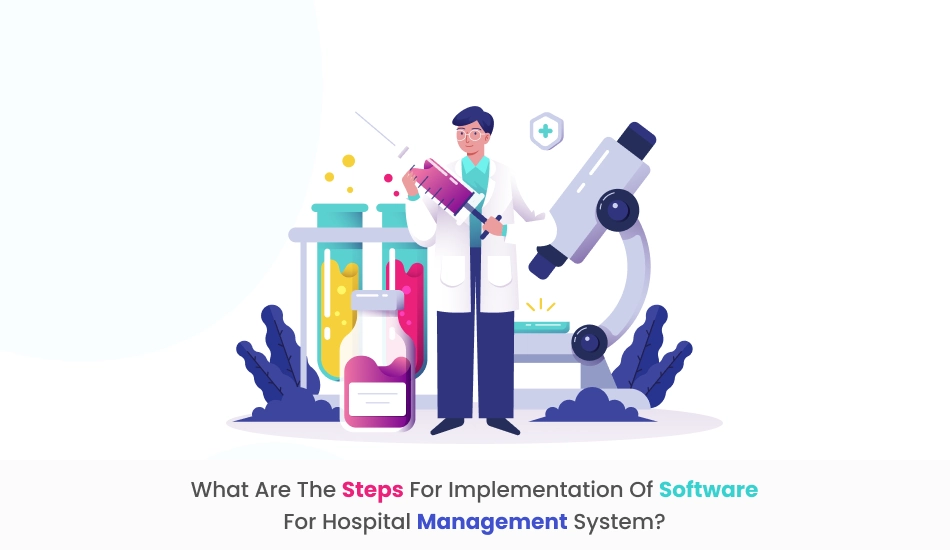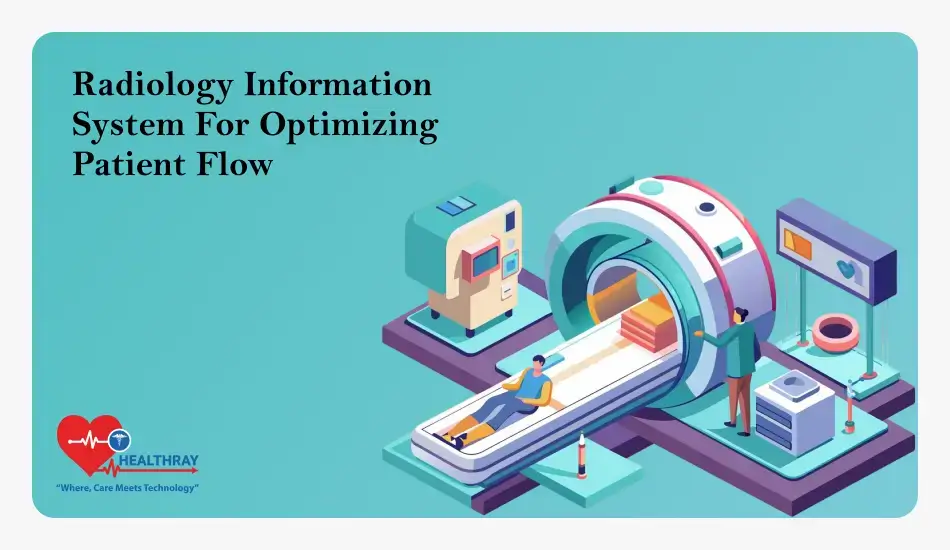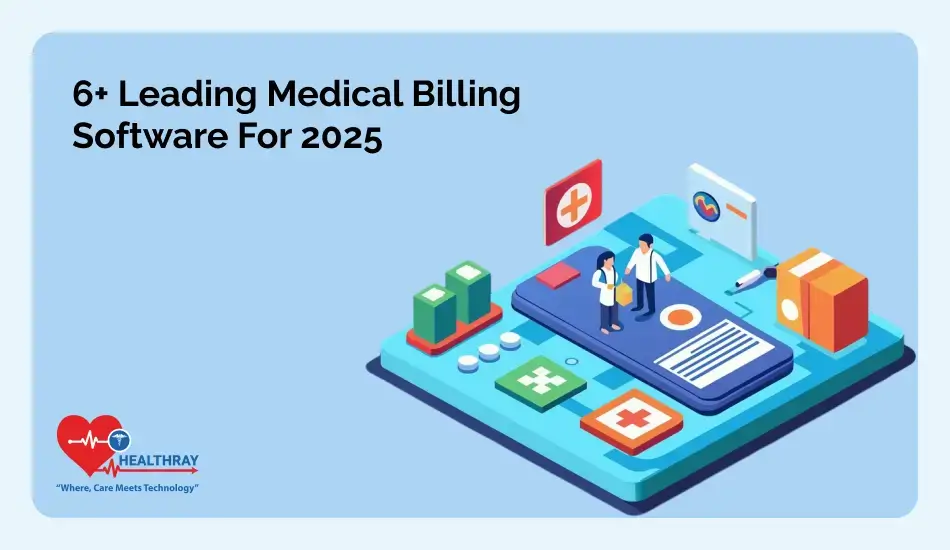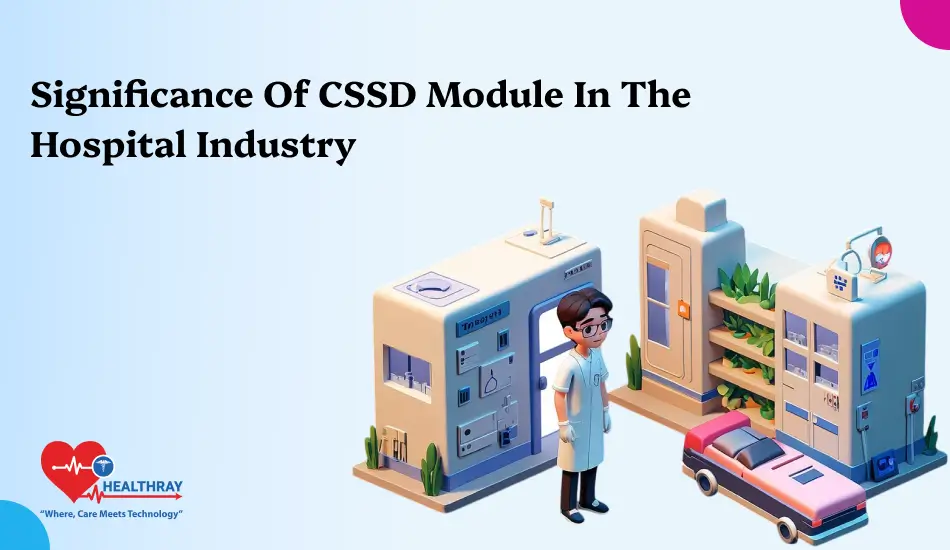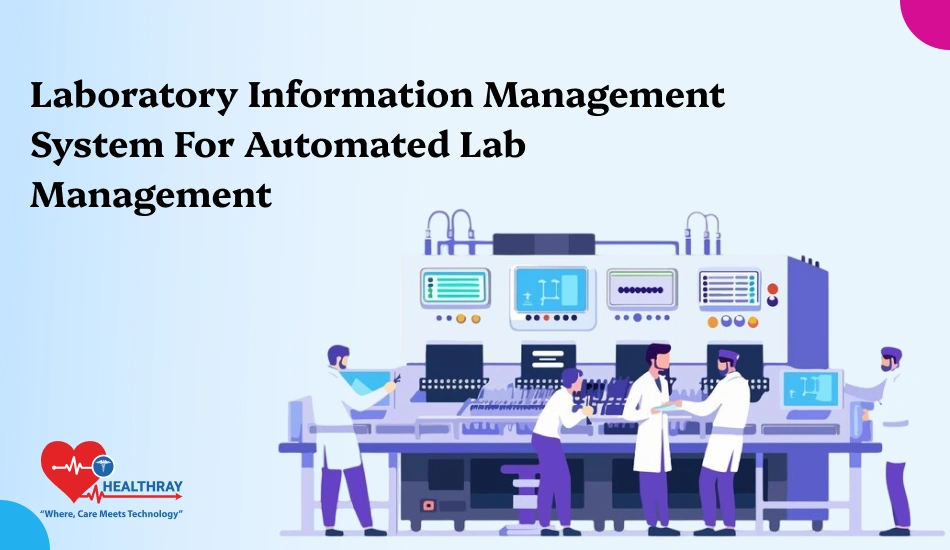Quick Summary
Selecting a hospital management system is the toughest task, requiring extensive planning and a large amount of human effort. It is a huge decision for hospitals as it affects all medical departments. Therefore, it is essential to follow sequential guided steps including, accessing hospital requirements by marking the areas of improvement, scrutinizing the best HMS that complies with the hospital’s objective, requesting an HMS software demo, and launching in the hospital. Lastly, training for the healthcare staff.
Introduction
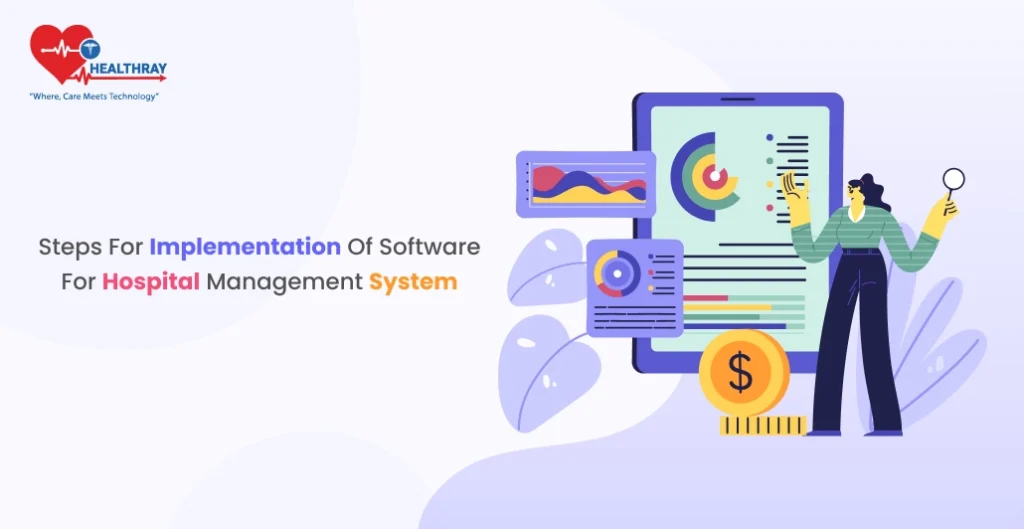
In this dynamic environment, where the population is increasing tremendously, along with increases in numerous types of diseases. These prevalent diseases are hard to count in numbers. Therefore, exponential rise in the demand for hospital management systems in the healthcare industry.
Working in the medical sphere is not a piece of cake. It is the fundamental reason for maximizing turnover and dissatisfaction rate. Moreover, simplifying clinical operations requires some pennies from your pocket and a wise mindset to choose the leading one. It centralizes data of all healthcare departments whether related to surgical or patient.
Modern hospital management systems have paved their footsteps to large hospitals, where there is a high need for sophisticated systems to maintain higher staff and large amounts of data sets. Furthermore, It can’t be surprising how one software manages all hospital departments. Now, every hospital is adopting healthcare management systems. It’s your time to embrace, otherwise it will be too late.
For implementing a hospital management system, it is required to adhere to numerous steps for improving healthcare delivery. Some required steps are identifying hospital needs, selecting the leading HMS like Healthray software, customizing software as per prerequisites, deploying the software, and executing post-implementation steps.
Why Should Hospitals Need Software for Managing Operations?
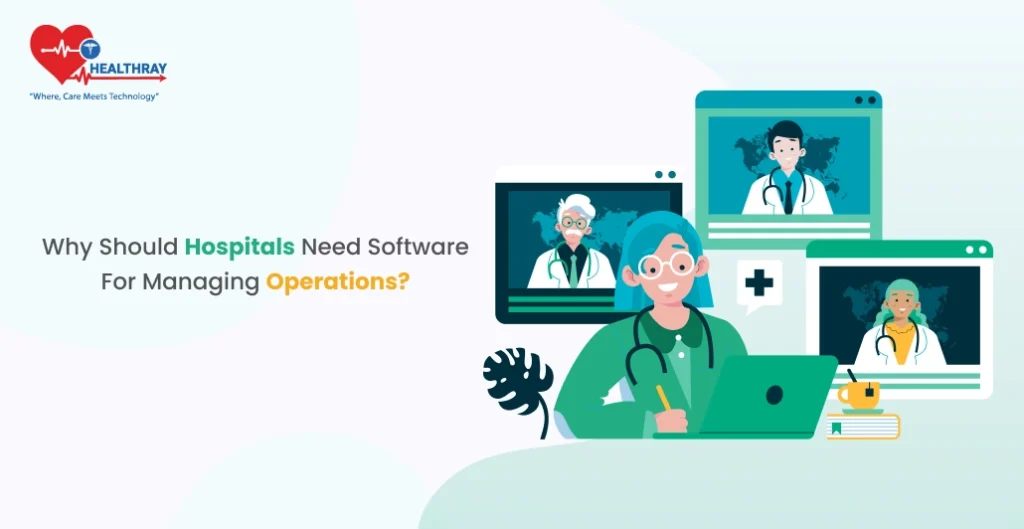
Nowadays, every patient is fascinated by advanced healthcare technologies because it is a time-efficient system, enhancing living standards for people and maintaining accuracy in making decisions. Technology integration in healthcare has a profoundly optimistic impact on the medical services system. Let’s deep dive into the vital importance of Healthray’s hospital management software :
Centralized Hospital Control :
- With Healthray’s Hospital Management System, overseeing entire healthcare activities from a single or remote location is no longer a dream.
- This software makes everything possible in the healthcare industry. Also, ease in managing and tracking the healthcare workforce.
- Hospital information systems provide hidden and meaningful healthcare insights, which are difficult to spot through manual analysis. Therefore, control those ailments that are hard to see.
- The superior staff has more advantages such as improving response from decentralized staff, monitoring their activities, clear communication between departments, and enabling faster decision-making.
- It improves healthcare operations, minimizing medical errors, increasing operational efficiency, and minimizing hospital expenditure.
Lowers Human error :
- Automated administrative system including appointment management, receiving
frequent reminders, ease in conducting day-to-day tasks, and medical billing. - The hospital management system manages various types of data within a few clicks. Further, these data include administrative data, patient data, hospital financial data, and medical research data.
- Supports in making several clinical and patient decisions such as inventory-related decisions, treatment planning, medication development decisions, and financial decisions.
- It aids in revenue cycle management which helps in managing hospital finances effortlessly. Therefore, it facilitates billing management and improves stability in cash flow.
Standard Security Protocols :
- In the current scenario, it is predominant to maintain data security because cyber crimes are more prevalent these days. Therefore, it enhances patient safety.
- Implementing various security protocols such as restricting the accessible information, and suggesting strong credential passwords. Also, maintains the entire healthcare data and current transactions in the coding format.
- Maintaining healthcare and patient confidentiality is one of the hospital’s objectives. Therefore, it enhances the satisfaction of patients and might retain old patients.
- Data security of medical records is a troublesome process because it requires systematic steps without any error. Additionally, aids in medical regulatory compliance.
Inter-departmental Management :
- In a healthcare work environment where healthcare professionals can’t control their work tasks as it’s difficult to predict emergency cases. Therefore, it is needed to have proper communication in all medical departments for effective healthcare services.
- With an integrated clinical system, it is easy to handle all patients with coordinated care, transfer files instantly, efficient communication with other clinical workers, and improves productivity level.
- There are numerous hospital departments such as the administrative management department, financial management department, accountancy management department, facility management department, pharmacy management department, and electronic health records (EHR) department.
- Therefore, it is hard to maintain coordination among them. We confidently say that the hospital management system makes tasks easier.
What are the Modules of Hospital Management Software?

In the realm of the medical industry, it is hard to manage all hospital modules. Sometimes, healthcare providers forget and neglect several healthcare modules. Several modules include a prescription management system, lab management system, financial management module, and staff management module. Deep dive into the key hospital management system modules :
Doctor Management System :
Including various healthcare services such as appointment management, frequent medication reminders, bar-code systems, precise medical reporting, and medical billing. A glimpse of doctor management system advantages :
- Minimizes no-show appointments
- Optimization of medical finances
- Minimizes operational work burden
- Accumulation of patient records
- Increases patient safety.
Patient Management System :
- Gathered patient medical records from numerous sources such as lab test results, patient history, demographic information, health insurance information, and captured radiology images. Additionally, it schedules appointments and receives reminders. Therefore, it improves patient flow.
- Patients access their medical information from prescription details to billing details. Therefore, they can fetch finance data easily and contribute to medical finance budgeting. Facilitate sharing medical reports with other healthcare providers from any remote location. Consequently, it enhances the patient experience.
Inventory Management System :
- The inventory management system is a part of a comprehensive hospital management system. Managing hospital inventory requires extensive human efforts and is hard to maintain. With Healthray’s hospital management system software, it is easier to manage inventory effectively.
- Monitor circulation of medical inventory from acquisition to disposing or selling. Additionally, it maintains precision in recording details related to storage.
- If a healthcare organization fails to manage inventory, patients may have adverse effects on their health. Further, there is a possibility of organs dis-functioning.
Streamline Accurate reporting :
- This practice management system automatically follows steps of generating concise reports that are easy to understand and draw meaningful conclusions for efficient treatment.
- Depicting healthcare information in such an easy manner that can be understood by junior healthcare staff. Therefore, it might be saving one’s life.
7 Steps to Implement Hospital Management Systems
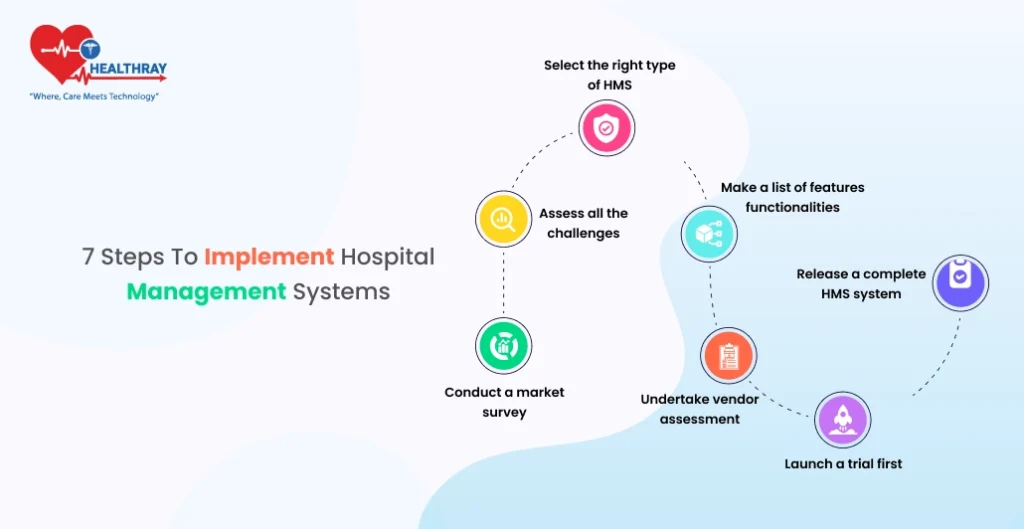
An online hospital management system is a significant one for improved management visibility. Manages entire patient information in ledger format from their demographic information to ward details. Therefore, it has numerous benefits such as enhancing patient care and improving patient engagement in hospitals. Implementing hospital management system in modern healthcare has undergone with following steps :
Conduct a market survey :
- It is necessary to follow some basic steps before conducting a market survey such as determining hospital requirements and ensures, aligned with healthcare goals and objectives.
- Consider several hospital aspects such as patient number, hospital size, and some particular healthcare challenges faced by healthcare staff.
- List down all factors and prevailing software on a piece of paper. Moreover, ensure all listed software has the necessary functionalities.
Assess all the challenges :
- Requires meeting with different healthcare departments. It is not possible to ask individual healthcare providers about their challenges in healthcare. Therefore, it is suggested to have a meeting with senior healthcare staff and understand their obstacles in achieving medical goals.
- Research hospital management systems and understand how this advanced software addresses medical challenges.
Select the right type of HMS :
- After assessing healthcare challenges, it is required to formulate budgeting for implementing software. Additionally, the budgetary factors such as purchasing costs, annual subscription costs, and training costs.
- Selecting hospital management software according to the hospital’s necessity and important to consider some vital factors such as user-friendly interface, scalability, and remote monitoring.
Step towards digital era with our healthcare solution
Revamp your hospital facilities and embrace change for better healthcare management. Ease in managing and organizing large medical datasets leads to effective analysis. Seize the opportunity now!
Make a list of features and functionalities :
To follow this step, it is required to gather information from different hospital software systems and write down those functionalities on a computer system or piece of paper. Moreover, scrutiny from a list of functionalities. Requires to have some basic features and functionalities :
- Patient management system
- Integration with diverse systems
- Electronic health records (EHR)
- Virtual medical accessibility
- Robust medical data security
- Appointment management system
- Laboratory information systems
- Pharmacy management system
- Doctor services report system
Undertake vendor assessment :
- Vendor assessment is an important aspect of selecting hospital management software. Some factors are needed to consider while choosing a vendor such as the vendor’s standing position in the market, reviews of hospital products, and software costs as per the hospital’s budget.
- Ensure that necessary features and functionalities are incorporated into the hospital software. Additionally, double-check the privacy security regulations and carefully read the software service agreement.
Launch a trial first :
- Before making the purchasing decision of hospital management software, it’s important to first demonstrate selecting the hospital management system.
- Check some points while demonstrating the hospital management system, such as user-friendly interface, online appointment management, electronic medical records, and digital billing system.
Release a complete HMS system :
- After complying with all necessary steps and conducting trial steps efficiently, the right time to launch a hospital management system in the hospital.
- It’s predominant to adhere to post-implementation steps such as training the hospital staff, and compliance with necessary security measures as the vendor suggested.
Conclusion
Hospital management systems have many uncountable features that compel healthcare professionals to adopt healthcare management system software. Implementation requires necessary steps to follow for effectively managing hospital operations. Moreover, some functionalities are needed while implementing a hospital management system such as an intuitive interface, laboratory management system, and consolidation ability of patient health records. Consequently, helps in achieving hospital objectives quickly.
